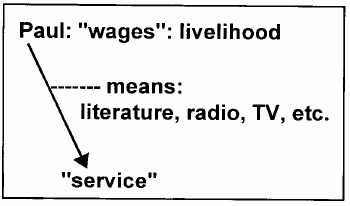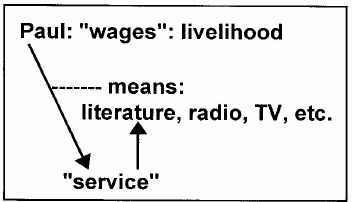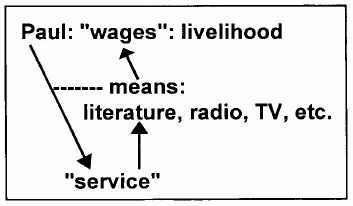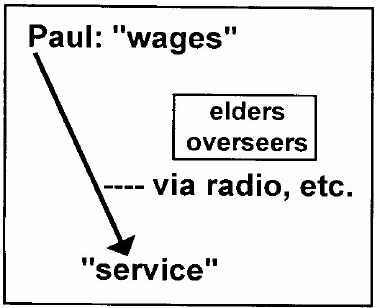
Justifying An Unscriptural Practice
by Gene Frost
 |
Justifying An Unscriptural Practice by Gene Frost |
First appeared in the Gospel Anchor, September 1983.
All authority in religion belongs to Jesus Christ. (Matt. 28:18) He alone has the right to prescribe what constitutes proper conduct and service; it is not given unto us. (Jer. 10:23) Our source of His authority is the New Testament revelation. (John 16:13, 1 Cor. 14:37) In order to know and understand the divine will we must turn to this revelation and not to our own understanding. (Eph. 3:5, Prov. 3:5) One should always approach a study of the Bible with an attitude of "I know nothing" whereas "God knows all." Only as one has a determination to know the truth of God can he ever hope to attain it. A willingness to believe and practice anything less makes one susceptible to religious error and eventual rejection by God. (2 Thess. 2:10-12)
However, it is this desire to have oneís own way that leads from the truth. Principles of sound exegesis are abandoned and fallacious reasoning is employed in order to justify the accepted faith and practice. D. R. Dungan, in his text, Hermeneutics, describes the dogmatic method of interpretation as the product of this desire: "first, it assumes the doctrine to be true; and, second, it regards it as certainly true by being proven. It proceeds by assumption and proof."
Principal villains in our day and within our fellowship of saints are two expressions of dogmatism. One, as Dungan denominates, is traditionalism, and the other, as I prefer to call it, is pragmatism. We see these dogmatic methods expressed in our current study of "churchesí support of preachers."
Traditionalism
"In the heat of argument, with a determination to find a theory in the Scriptures, anything is accepted as proof. If the desired proof cannot be found in the Bible, it will be found somewhere else. The fathers, the canonized authorities, the practice of the church - anything, to save the doctrine, from which we are determined not to part." To justify a centralizing of churchesí funds under the oversight of a preacher, the proponents of the practice do precisely this: they appeal to "the practice of the church." Preachers receiving support from several churches are cited as having had a "work fund" for years out of which they publish literature, conduct a radio program, etc. This is an appeal to tradition, a point that we have already considered in a previous article on this subject.
Pragmatism
Pragmatism looks to factual occurrences, practical situations, which are assumed to be good and therefore right, and from this premise reason back in search of authority to justify it. It begins with what is, and then proceeds to search for permissive authority, instead of beginning with authority and contemplating what might be done to execute it. The desire is the father of the project rather than the project the product of the authority.
Assuming it to be a good work to place funds under the preacherís oversight, projects have been advanced which are now called in question. Instead of citing Scriptures that prompted the projects, efforts to justify the projects take the form of reasoning backward from the practice to the authority. It is assumed that a project (printing and distributing literature, conducting a radio program, etc.) must be employed, and from this assumption one asks, what must be allowed for the project to work? Since the churches sent Paul "wages," then somehow funds for these projects must be counted as a part of "wages." How can this be justified?
CHART # 2

Paul received "wages" from churches to do the Corinthians a "service." "Wages" were for his "wants," that he might "live of the gospel." (1 Cor. 9:14, 2 Cor. 11:7-9) "Service" is a noun, the result of the action of preaching. If Paul used any means other than face to face teaching (such as distributing literature), it is not indicated nor is it inherent in the word. Yet means may be employed to convey teaching, i.e. one may use tracts, speak over the radio, etc. So, reasoning backward, since Paul did "service," he could have used literature, radio, etc., had these means been available.
CHART # 3

It is assumed that he would have had the oversight in printing the literature, contracting and producing the radio program, etc. Reasoning back to his "wages": since "service" may employ means of doing the service, then the means may be included in the wages.
CHART # 4

Therefore, a preacher (like Paul) may receive "wages" for his personal livelihood, and to print literature, conduct a radio program, etc.
CHART # 5

This involves a lot of assuming! It assumes that a project for preaching the gospel must be employed. It assumes that the oversight belongs to the preacher. And it assumes that "wages" may be redefined to include more than his "needs" and "necessities." (The last item we covered in a previous article and therefore will not address it again. We will look at: [1] "The preacher must do his work," and [2] "Oversight.")
1. The Preacher Must Do His Work
It is assumed that a preacher is to determine what constitutes his work in preaching the gospel, and for this work the churches have a responsibility to supply the funds. If his work is printing and distributing literature, then it is reasoned that churches need to send him enough "wages" to do this. How else can he do "his work?" we are asked.
Our liberal brethren used to ask us, "How then can it be done? How can we have a national radio and television program without a sponsoring church?" Question: must the churches have a national radio program in order to preach the gospel? Does a preacher have to circulate a national magazine in order to teach the gospel? Too often, a project is assumed to be a necessity when it is an expedient. To make an expedient an essential that "has to be justified" is fallacious, and in so doing brethren will often violate restrictions and limitations God has placed upon churches and preachers.
2. Oversight
In reasoning backward from "service" to "means," it is assumed that this is under the preacherís oversight. This is a fatal assumption. When a preacher teaches on radio, does or should the program become his, under his oversight? To put it stronger, may elders (who are given the oversight of converting the funds of the church into the service) relinquish the oversight of funds and entrust them to the preacher to oversee? This was precisely our objection to the "sponsoring church": elders of the sponsoring church assumed the oversight of funds which were under other elderships. I find it no less a violation to replace a sponsoring church with a preacher!
The church may conduct a radio program anywhere in the world; the elders have the oversight. They may enlist the preaching service of any faithful preacher. This is the scriptural pattern.
CHART # 6

The fact that Paul rendered a service does not suggest the means or restrictions placed upon him. This is not determined by the word "service." "Service" (diakonia) is a noun and is a result of what he did (verb): in this case "preached the gospel." A service may be rendered through the printed page, radio, etc., but the word itself does not suggest means at all, or who oversees means. Means and oversight of means is another matter. All we know from the text (2 Cor. 11:7-9) is that he preached the gospel to the Corinthians. The word "service" by no stretch of the imagination implies that funds beyond personal support were placed within "wages."
"Service" Does Not Dictate "Wages
The fallacy of trying to redefine "wages" by reasoning backward from the word "service" becomes apparent when consistently applied. If indeed "service" means that a preacher may receive in his "wages" funds enough to publish a nationally-circulated paper, to control a radio program, then since every preacher may receive wages every preacher may solicit churches for funds to publish a paper, etc.! And we are back to square one: who has the oversight of a work (employment of a means), the elders or the preacher?
May a preacher solicit funds from enough churches to enable him to have a radio program with national coverage? Some answer, "Yes, if overseas," but "no, if in the United States." Strange principle that works in only part of the world. The only explanation that I have heard for this arbitrary rule is that in the U.S. there are churches able to have their own programs in their own areas. And so the preacher may receive "super-wages" only where churches are weak and his "service" does not cross into areas where churches are strong and able to do this service. Just where and how these diocesan lines extend has not been made clear. (I suppose they are the same diocesan lines that separate the evangelism of a foundation [in holding a tent meeting] and that of the church!) Arbitrary rules, but no Scriptures to tell us of these things.
We have problems when we leave authority as stated and try to establish it pragmatically by reasoning backward from results to means, ignoring the who and limitations.
Since the preacher is authorized to receive "wages" to meet his needs, and not some kind of "super-wage" to oversee various projects, does this mean that he cannot use publications, radio, etc.? No. He may use every means available. If he can afford to publish, purchase radio time, etc., that is fine. If the church publishes a periodical, purchases radio time, etc., he may be used by the church to write, or preach on the air, etc. What he may not do is shift the oversight from the elders to himself and reduce the church to a fund-raiser for the preacher!
"But churches overseas cannot afford a radio program. How can the gospel be preached on the radio where the church is not established or is but newly established?" In the same way that the gospel is preached where the church is well established. The church contracts the program; it is under their oversight. The elders see that the funds are converted into the service; they do not give the funds to the preacher to convert under his oversight. The church is not governed by any diocesan lines: it may preach the gospel anywhere in the world. It may contract a radio program in a foreign field as well as locally. For example, a church may be convinced of opportunities to preach the gospel over radio in South Africa. They may contract with a station there, and a preacher may help make the arrangements. The program is under the oversight of the church financing it. "What difference does it make whether the church has the oversight or sends the money to the preacher and let him oversee it?" (The same difference it makes whether the church sends directly to a work or to a "sponsoring church.") The elders are responsible to see that things are done rightly, and when this responsibility is transferred to the preacher they become derelict in duty. The church becomes a fund-raiser for preacher oversight, and, if it is scriptural anywhere, it is scriptural everywhere.
Support of Preachers
A fear has been expressed that this and previous articles will discourage the support of preachers in weak areas. Why? Nothing has been suggested to this end. To the contrary, God has ordained that they who preach the gospel should be supported. Brethren should be generous, realizing the trying conditions under which some labor. Some live in countries where costs are astronomically high, and this should be taken into consideration. There are men who suffer for lack of support, but who because of their love of the truth are willing to sacrifice. Brethren should take an interest in the welfare of preaching brethren everywhere, and determine that they be properly supported.
Discourage the support of preachers? No! We have only addressed a problem of human projects placed under preacher oversight for which there is no Scriptural authority. Send the preacher his "wages," and be generous: only do not call "wages" what the churches are responsible for overseeing. If funds are his wages, then he may spend them in any honorable way without giving an account to the churches. If he has to give account, then the funds are not wages! Let us not deceive ourselves. God is not deceived.
Back to the Top | Last Article in Series | Back to "Support" Menu | Back Home